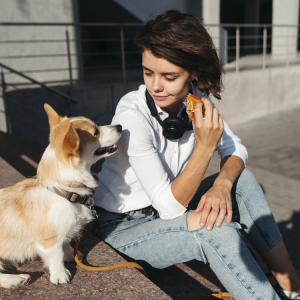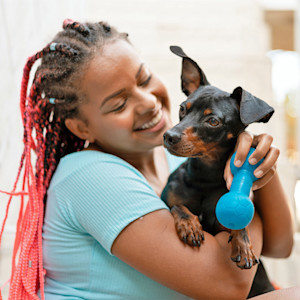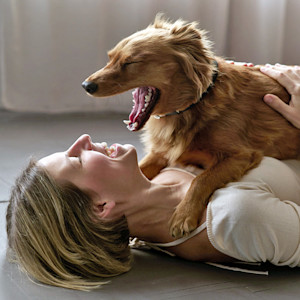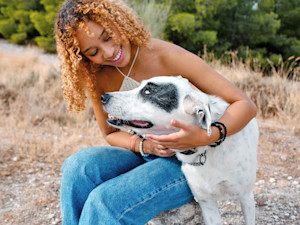Do Dogs Fake Being Sick for Attention?
We’d all love to think that our pups are sweet baby angels incapable of deceit. But are they, actually?
When I look into my dogs’ big round eyes, it’s hard to believe they’d ever lie to me. But then, they see me eating a bowl of cereal and start whining like they haven’t been fed for a week, and I’ll admit, I start to wonder.
Anecdotally, we’ve all probably heard stories about dogs faking being sickopens in new tab for attention, but are any of them true? Is this a classic case of interpreting a very normal dog behavior through a not-so-accurate human lens, or do dogs really know how to yank our chains? I asked the experts to find out.
They’re not lying. But they’re not not lying.
Science has shown that on some level, dogs do sometimes think about how to manipulate circumstances to their benefit. Animal behaviorist Mia Bonadonna cites a small 2017 studyopens in new tab published in Animal Cognition, which found that, as she puts it, “dogs may knowingly deceive uncooperative human competitors for high-value treats.” (The actual results of the study, as described opens in new tab by Smithsonian, are genuinely fascinating.)
Still, Bonadonna says, “I think an argument can be made that animals are not necessarily being willfully or maliciously deceptive. Rather they are active, perceptive learners that are more likely to repeat actions that result in a benefit for their survival.”
How much do you spend on your pet per year?
In other words, dogs probably don’t “lie” in the same ways (or for the same reasons) that people do. It’s more likely that they figure out which behaviors reward material desires like food, toys, and attention and act accordingly.
Certified professional dog trainer Dae Grodin also does not believe that dogs are capable of deceit in the way that humans typically understand it. “I think dogs more or less think about what happens [when] they do xyz behaviors,” she says. “In order to have emotions/actions like deceit, guilt, etc., there needs to be a higher level problem solving involved, along with emotional forethought.”
Although it’s rare, Grodin does believe that dogs might sometimes fabricate afflictions for attention. She met one such trickster years ago at the kennel where she worked at the time. The dog would behave normally all day, and then, when their parent came to get them, they’d start limping. At first, the parent would get concerned and reward the dog with attention — but once they caught on, the afternoon limping charades finally stopped. Curious.
There’s a difference between getting your attention and being really sick.
Of course, smaller deceptions are more common. I felt personally vindicated when Grodin said she believes that some pets try to “convince” their parents they need a snack or another meal when they’ve just eaten. (I’ll never give my dogs seconds after dinner again.) Grodin says she’s also seen dogs run to the door when they want another pooch’s toy. Once the other dog runs to the door, the first dog will run back to steal the coveted prize.
If your dog’s condition is not severe, and they don’t appear to be in distress, Grodin suggests that pet parents might conduct a little experiment. “If we think [the strange behavior] is attention based, the individual can try not giving any attention to that certain behavior and see how their pet reacts,” Grodin says. “They can try this for a few days and see if the behavior changes or not. If it is prolonged, there may be something else going on where they may need further diagnostics.”
But if your dog genuinely appears sick or injured, it’s very unlikely they’re faking it. Regardless of how they present themselves, it’s important to take dogs’ symptoms seriously.
“While I love the idea that dogs have the agency, social complexity, and intellectual ability to deceive a human,” Bonadonna says, “ultimately, it is harmful to assume that a dog might fake an injury or illness … Dog guardians should always consult a veterinarian when there is a concern that their dog is sick or hurt.”
When in doubt, always assume there is something actually wrong.
Yes, there’s a chance that an observant dog might become injured, notice the amount of attention they receive, and fake an injury later. But generally, this would be a stretch. “Acute pain floods the brain with so much stress-associated hormone that memory retention related to beneficial things is challenging,” Bonadonna says. In terms of memory, mammals’ brains usually prioritize information related to threats, rather than things that are nice and soothing.
So while some pet parents and trainers might witness an Oscar-worthy performance from their pups, if your dog is sick or limping, it’s best to take it seriously.
“There is no data to suggest that our companion dogs are regularly deceiving us about injury or illness,” Bonadonna says. “To the contrary, the behavior data and research suggests that we humans frequently miss and misinterpret behavioral indicators of real pain, injury, and disease in our companion dogs.”
If you notice any significant change in your dog’s behavior, consult with your veterinarian to rule out any possible medical cause. Assuming otherwise could jeopardize your dog’s health, safety, and wellbeing. When it comes to your dog’s health, it’s always better to be safe than sorry.











